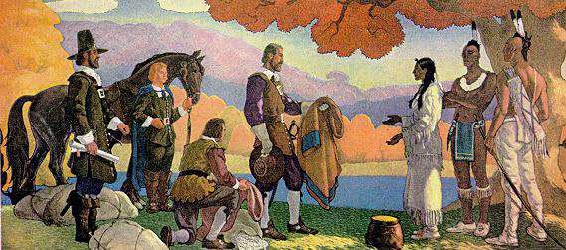On this Columbus Day, many are urging that we also remember America's indigenous people, the "Indians." Winchester has an explicit connection to the original residents of our area through our town nickname, the Sachems. A sachem (or sagamore) was a chief, leader, or king of the native peoples. Winchester's adoption of the name was particularly due to a woman, "Squaw Sachem," who was queen of the local indigenous tribes and the widow of Nanepashemet, who once ruled lands stretching from Weymouth north to Portsmouth, N.H., and as far west as Northfield. Sachem Nanepashemet was killed in 1619, in Medford, fighting Tarratines (Abnakis) who had invaded from Maine, leaving his wife, three sons, and a daughter.
Squaw Sachem and her sons were notably friendly with the English colonists and generally allied with them. Her people, however, were decimated by war and plagues mostly associated with the European settlers—including smallpox, which killed two of her sons, Sagamore John (Wonohaquaham) and Sagamore James (Montowampate) in 1633.
In 1638 Charlestown granted its citizens permission to settle land to the north, including Winchester, accelerating a movement that had already been occurring. Around that time Squaw Sachem sold her land in and around Winchester to settlers, reserving the right for her people to live, hunt and fish there during her lifetime. The sale is memorialized by the WPA mural above the circulation desk in the Winchester Public Library.

Squaw Sachem's favorite residence was probably on the west side of Upper Mystic Lake, near Winchester Country Club, where there was a "Squaw Sachem spring" that was visited by her people for many years after her death. Herbert Meyer Brook on Myopia Hill was originally known as "Squaw Sachem stream."
The story of Squaw Sachem is a great lesson in local history, and is one illustration of the complex interactions between the native inhabitants and the immigrants who went on to create our modern landscape—laying the groundwork for the many new immigrants who continue to arrive here. It is interesting, too, to note that Winchester's "native American" nickname memorializes a relationship with a particular individual, a relationship that was notable for peace and friendship. Finally, in this day and age, it is worth celebrating that that individual was a woman—one of power, grace and fortitude.
More information about Squaw Sachem and the selection of the "Sachems" nickname (which dates only from the early 1950s) can be found in the article "The Beginning of Winchester on Massachusetts Land" by Ellen Knight (a revision of her article "The Sachems of Winchester" published in 1999 in the Daily Times Chronicle). See also the Winchester History Online page on the town website.